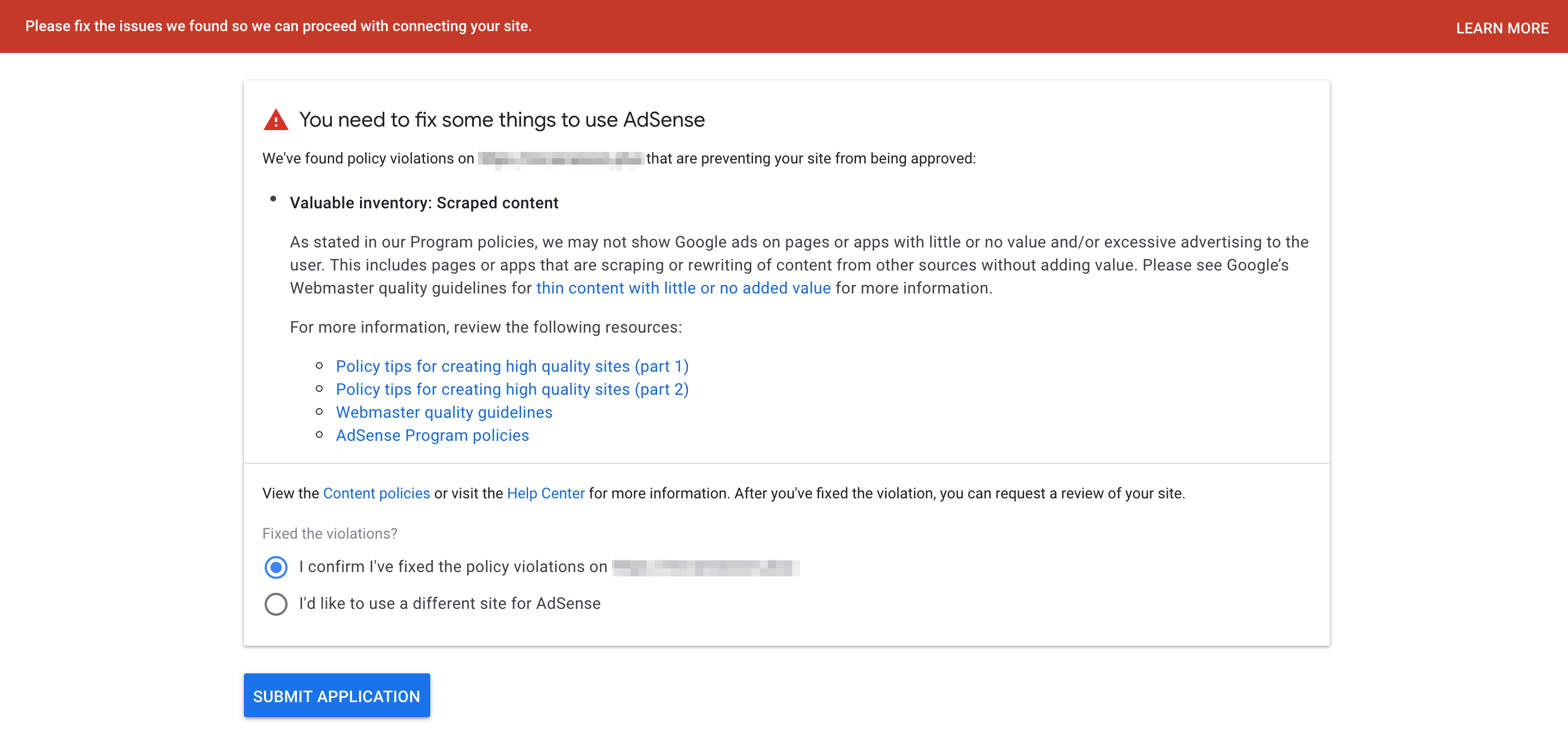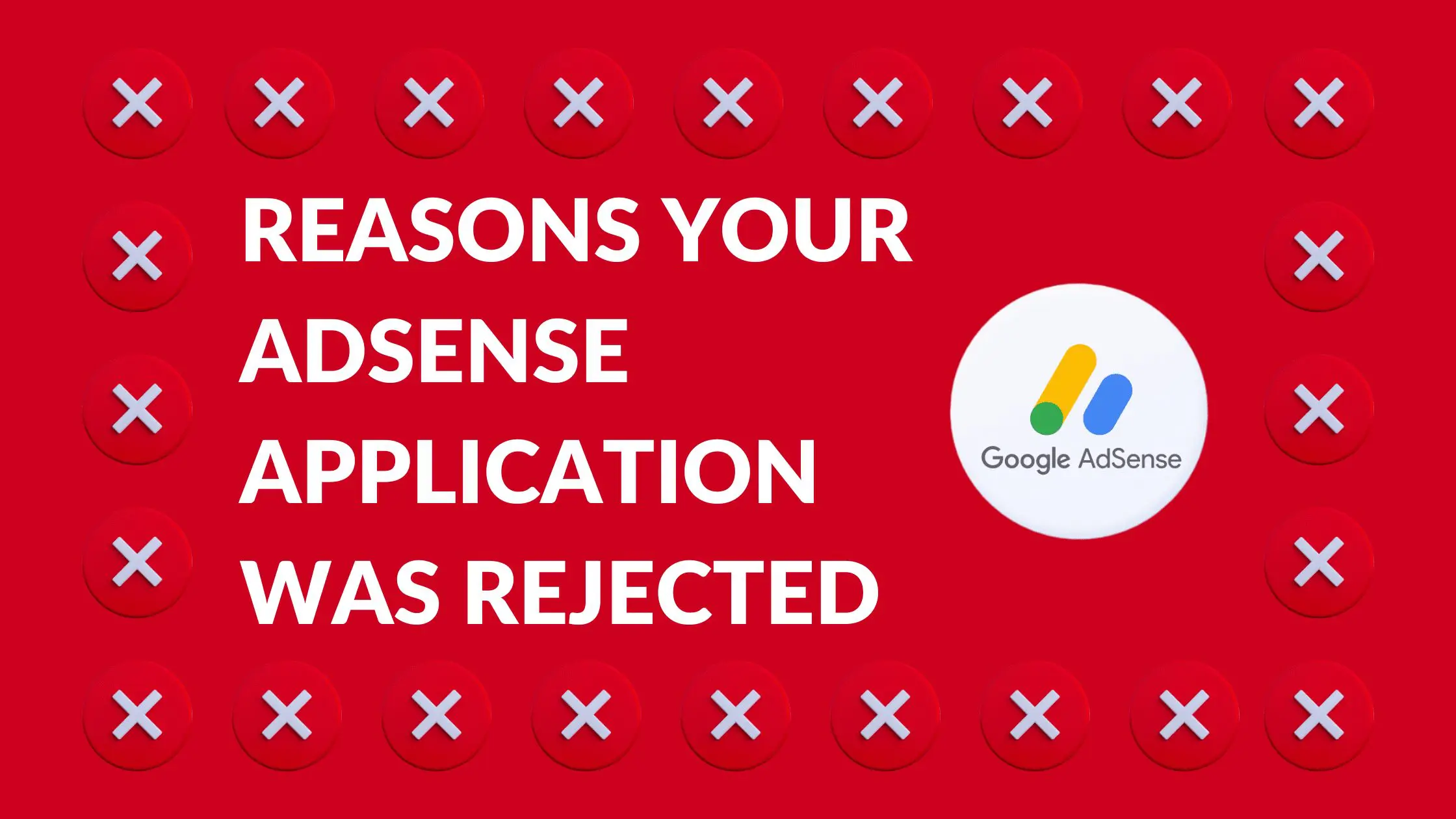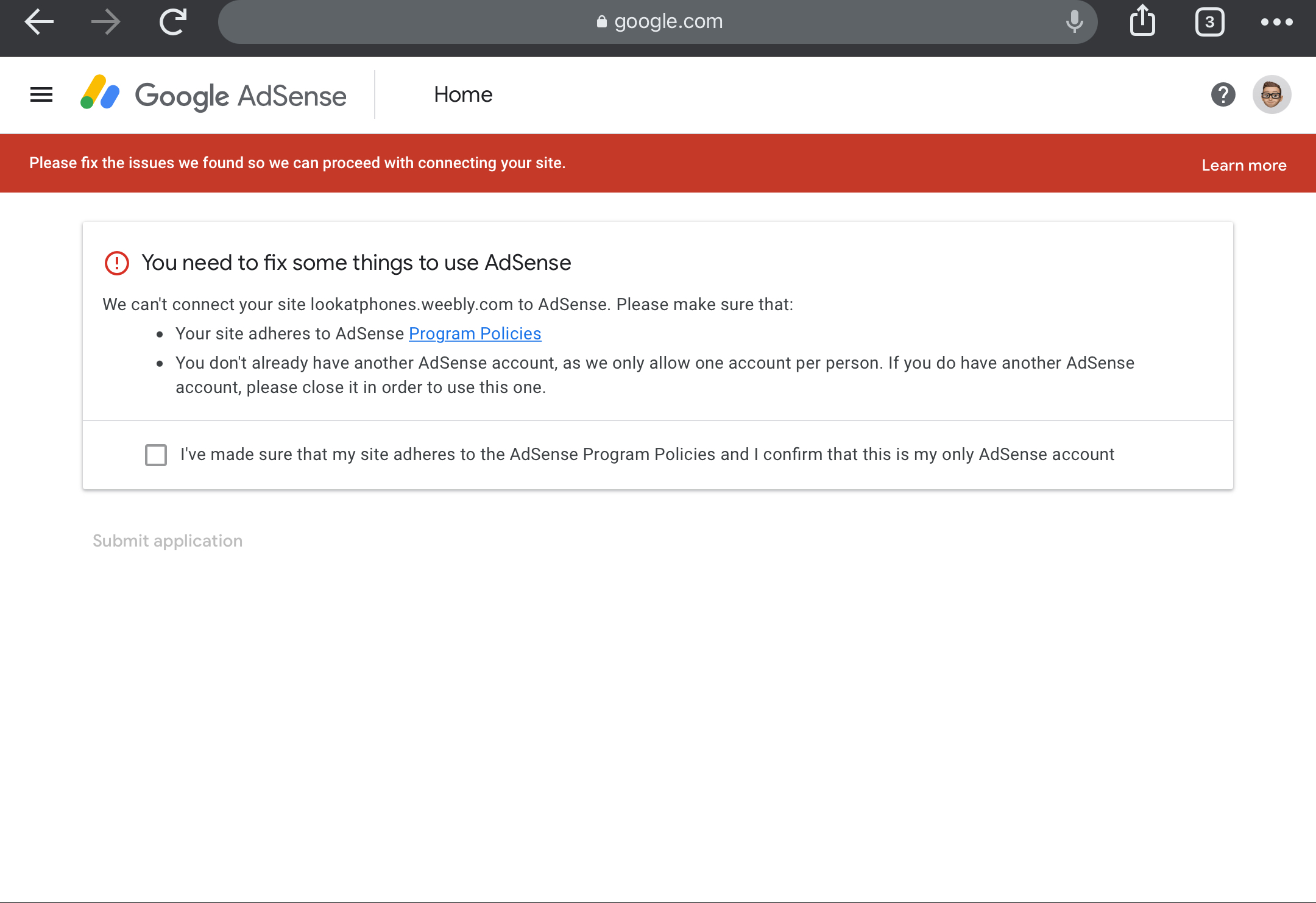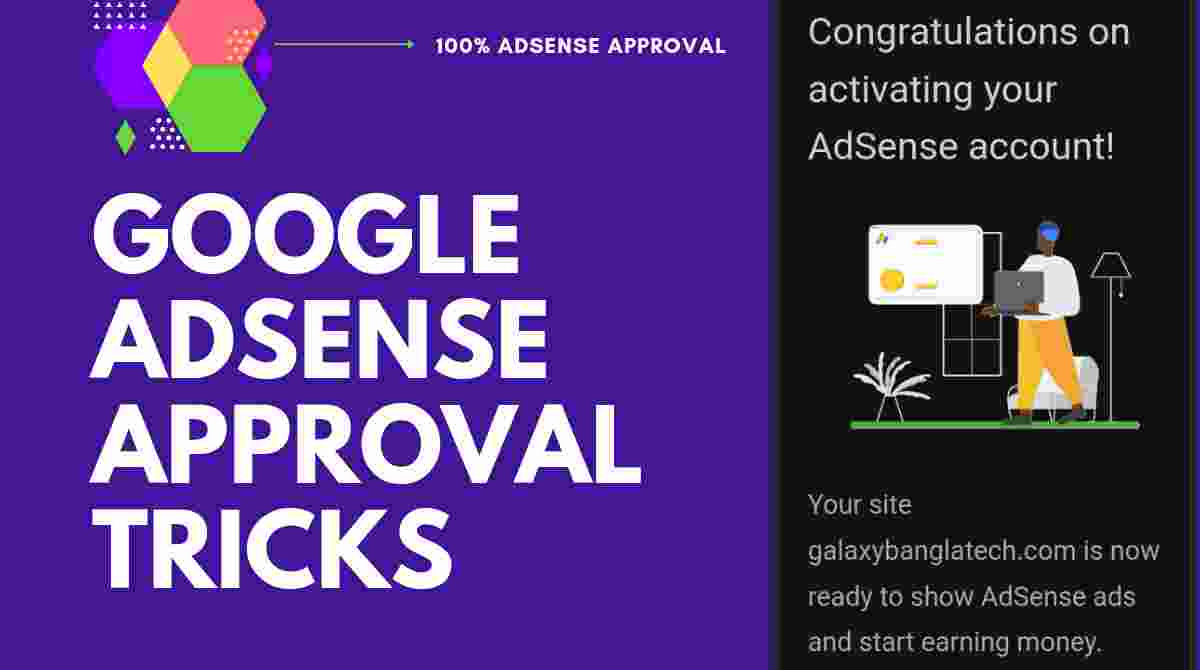
If your website is facing rejection, then you must think, Why Adsense Rejected Your Site? Don't let frustration overshadow your potential for online revenue! AdSense rejections can be perplexing, but fear of not understanding the root causes is the key to unlocking success. From policy violations to contentquality issues, myriad factors can lead to rejection. But fret not, as a beacon of guidance awaits!
Discover the secrets to aligning your website with AdSense guidelines effortlessly. Learn how toenhance content quality, ensure compliance with policies, and optimize your site for AdSense approval. With tailored strategies and detailed guidance, turn your rejection setback into a stepping stone toward a thriving, revenue-generating online platform. Don't let AdSense rejection hold you back; embrace this opportunity to transform your website and pave the way for sustainable monetization success!
The Importance Of AdSense Approval
AdSense approval is important for many reasons. First, it allows you to start monetizing your website and earning moneyfrom your content. This can be a great way to offset the costs of running a website or even to make a profit.
Second, AdSense approval can help to increase your website's credibility. When visitors see that your website has been approved for AdSense, they know that it meets Google's standards for quality and content. This can help attract more visitors to your website and make them more likely to stay on it for longer.
Third, AdSense approval can give you access to a variety of tools and resources that can help you optimize your website for AdSense earnings. Google offers a variety of tools and resources to help AdSense publishers, including ad placement optimization tools, reporting tools, and support forums.
Fourth, AdSense approval can help you build relationships with advertisers. When you are an AdSense publisher, you are essentially working with Google to display adson your website. This can help you build relationships with advertisers who may be interested in working with you in other ways, such as through sponsored posts or affiliate marketing.
Why Adsense Rejected Your Site - 10 Reasons
Here are 10 reasons why google adsense might reject your site:
1. Your website is too new -Google wants to make sure that your website is established and has a good reputation before approving it for Adsense. If your website is less than 6 months old, you may want to wait until it has had more time to grow before applying.
2. No content, poor-quality or inappropriate content -Google Adsense will not approve sites that do not have enough content or that have content that is of poor quality or inappropriate. Make sure that your website has a good amount of original, high-quality content that is relevant to your target audience.
3. Poor quality or non-organic traffic -Google wants to make sure that your website is getting traffic from legitimate sources. If your website is getting a lot of traffic from bots or other non-organic sources, your application may be rejected.
4. No privacy policy -Google requires all websites that use Adsense to have a privacy policy that explains how they collect and use user data. If you do not have a privacy policy, your application will be rejected.
5. You encourage users to click on the ads -Google does not allow websites to encourage users to click on the ads. This includes things like telling users that they will be rewarded for clicking on the ads or using misleading language to make the ads look like they are part of the website's content.
6. Links are from or lead to harmful or inappropriate sites -Google does not want to be associated with websites that lead to harmful or inappropriate content. Make sure that all of the links on your website are from reputable sources.
7. Server downtime -Google wants to make sure that your website is up and running at all times. If your website has a lot of downtime, your application may be rejected.
8. You sell counterfeit goods -Google does not allow websites to sell counterfeit goods. If you are selling counterfeit goods, your application will be rejected.
9. You are under 18 -Google does not allow people under the age of 18 to apply for Adsense. If you are under 18, you will need to wait until you are 18 years old to apply.
10. You've already been banned before -If you have already been banned from Adsense, you will not be able to apply again.
If your application has been rejected, you can appeal the decision by contacting Google Adsense support. Be sure to provide them with a detailed explanation of why you believe your website should be approved.
Does AdSense Only Pay For Clicks?
No, AdSense does not only pay for clicks. It also pays for impressions, which are the number of times an ad is seen on your website. The amount of moneyyou earn per click or impression will vary depending on a number of factors, such as the type of ad, the advertiser, and the location of your audience.
Here is a breakdown of how AdSense pays:
1. Impressions -When an ad is displayed on your website but not clicked on, you earn a small amount of money. This amount is called the cost-per-thousand-impressions (CPM). The CPM will vary depending on the advertiser, but it is typically between $0.10 and $0.30 per 1,000 impressions.
2. Clicks -When a visitor clicks on an ad on your website, you earn a fixed amount of money. This amount is called the cost-per-click (CPC). The CPC will vary depending on the advertiser, but it is typically between $0.01 and $0.05 per click.
Here are some tips for increasing your AdSense earnings:
- Monitor your AdSense performance -Regularly check your AdSense reports to see how your ads are performing and make adjustments as needed.
- Use a variety of ad formats -Experiment with different ad formats, such as text ads, display ads, and video ads, to see which ones perform best for you.
- Place your ads strategically - Place your ads in places where they are likely to be seen and clicked on.
- Target your ads to your audience -Make sure you are displaying ads that are relevant to your website's content and audience.
- Create high-quality content - The more valuable your content is to your visitors, the more likely they are to click on your ads.
How Do I Fix My AdSense Site?
If your AdSense site has been rejected, it's important to identify the reason for the rejection and take steps to address it. Here's a step-by-step guide on how to fix your AdSense site:
Step 1 - Identify The Reason For The Rejection
Google AdSense will usually send you an email notification explaining why your site was rejected. Carefully review the email to understand the specific reasons for the rejection. Common reasons for AdSense site rejects include:
- Other issues -In some cases, AdSense may block a site due to technical issues or other concerns.
- Policy violations - This refers to violations of Google's AdSense Program Policies, which cover topics such as acceptable content, prohibited activities, and publisher responsibilities.
- Invalid traffic -This refers to fake or manipulated clicks on your ads, which can be caused by click fraud or other means.
Step 2 - Take Corrective Actions
Once you understand the reason for the rejection, take the necessary steps to address the issue. For example:
- If there are other technical issues -Contact AdSense support for assistance in resolving any technical problems that may be causing the rejection.
- If policy violations are the issue -Review and revise your website's content to ensure compliance with Google's policies. Remove any content that violates these policies.
- If invalid traffic is the cause -Implement measures to prevent click fraud, such as using CAPTCHAs or limiting ad clicks from specific sources.
Step 3 - Request A Review
Once you have taken corrective actions, submit a request for review through your AdSense account. This will notify Google that you have addressed the issues and are requesting that your site be reviewed for reinstatement.
Step 4 - Wait For Google's Response
Google will review your request and notify you of their decision. If your request is approved, your AdSense account will be reinstated, and you can start displaying ads again. If your request is denied, you will receive further instructions on how to appeal the decision.
Additional Tips
- Seek help -If you need assistance, contact AdSensesupport for guidance and advice on resolving your site's issues.
- Be patient -The review process can take some time, so be patient and wait for Google's response.
- Provide clear evidence - When submitting a review request, provide clear and detailed evidence that you have taken the necessary steps to address the issues that led to the block.
How Do I Get Google AdSense Approval 2023?
Evaluating content standards for AdSenseis crucial for ensuring that websites adhere to Google's guidelines and maintain the quality of advertisements displayed. These standards encompass various aspects of website content, including:
1. Original and High-Quality Content -Websites should feature original, well-written, and informative content that provides value to users. Plagiarism, duplicate content, or content that lacks depth and substance will not meet AdSense standards.
2. Relevant and Appropriate Content -Content should be relevant to the website's overall theme and should not be offensive, misleading, or harmful. AdSense prohibits websites with content that promotes violence, hate speech, illegal activities, or sexually explicit material.
3. Sufficient Amount of Content -Websites should have a substantial amount of content to demonstrate their commitment to providing value to users. Websites with minimal content or those that rely heavily on external linksmay not meet AdSense standards.
4. Clear and Professional Design -The website's design should be clear, professional, and easy to navigate. Websites with cluttered layouts, excessive advertising, or pop-ups may not be approved for AdSense.
5. Compliance with Google's Policies -Websites must adhere to all of Google's AdSense program policies, including those related to copyright, trademark, and intellectual property rights. Websites that violate these policies may be banned from AdSense.
6. User Experience-The overall user experience should be positive and engaging. Websites with slow loading times, broken links, or technical errors may not meet AdSense standards.
7. Privacy Policy -Websites must have a clear and comprehensive privacy policy that outlines how they collect, use, and share user data. This policy should be readily accessible to users.
8. No Encouragement to Click Ads -Websites should not encourage users to click on ads in any way. This includes using misleading language, making ads appear as part of the website's content, or offering incentivesfor clicking ads.
9. Links to Reputable Sources -Links on the website should be from reputable sources and should not lead to sites that violate Google's AdSense policies.
10. Technical Stability -Websites should be technically stable and have minimal downtime. Websites with frequent technical issues may not be approved for AdSense.
By adhering to these content standards, websites can increase their chances of being approved for AdSense and maintain a positive reputation with both users and advertisers.
Frequently Asked Questions About Why AdSense Rejected You Site?
Why Is AdSense Not Approving My Website?
Insufficient content. Your site was found to have too little text, and/or your site was deemed to be "under construction." Sites should have sufficient high-quality content to provide meaningful user experiences and allow us to serve relevant ads to users.
Why AdSense Rejecting My Blog Site?
Here are a few primary reasons why your AdSense account gets rejected. You violated Google policy rules. You don't have enough content (average number of articles). You are not getting enough traffic to your blogs or websites.
Can I Reapply For AdSense?
Click Reactivate account. Resubmit your site for approval. We then check your site to determine if it's ready to show ads and meets the AdSense Program policies. This usually takes a few days, but in some cases, it can take 2-4 weeks.
How Much AdSense Pay For 1,000 Views On Website?
How much does AdSense pay per 1000 views? Roughly $0.2 – $2.5 per 1,000 views. However, it depends on many factors including the content of your site, location of your users, time on site, and device breakdown. Use our AdSense revenue calculator above to find out how much you could earn with your website.
Conclusion
The reasons behind AdSense rejecting a website are multifaceted and often require a meticulous examination of various factors. From policy violations and content quality issues to site design, user experience, and technical aspects, each element plays a crucial role in the approval process. Understanding these reasons isn't merely about acknowledging the rejection but rather a pivotal step toward rectification and improvement.
Despite the initial setback of rejection, this process serves as a valuable learning experience. It empowers website owners to refine their strategies, elevate content quality, ensure compliance with AdSense policies, and optimize their site for better user experience. Embracing this opportunity for self-assessment and enhancement can transform a rejected site into a platform that aligns seamlessly with AdSense guidelines.


